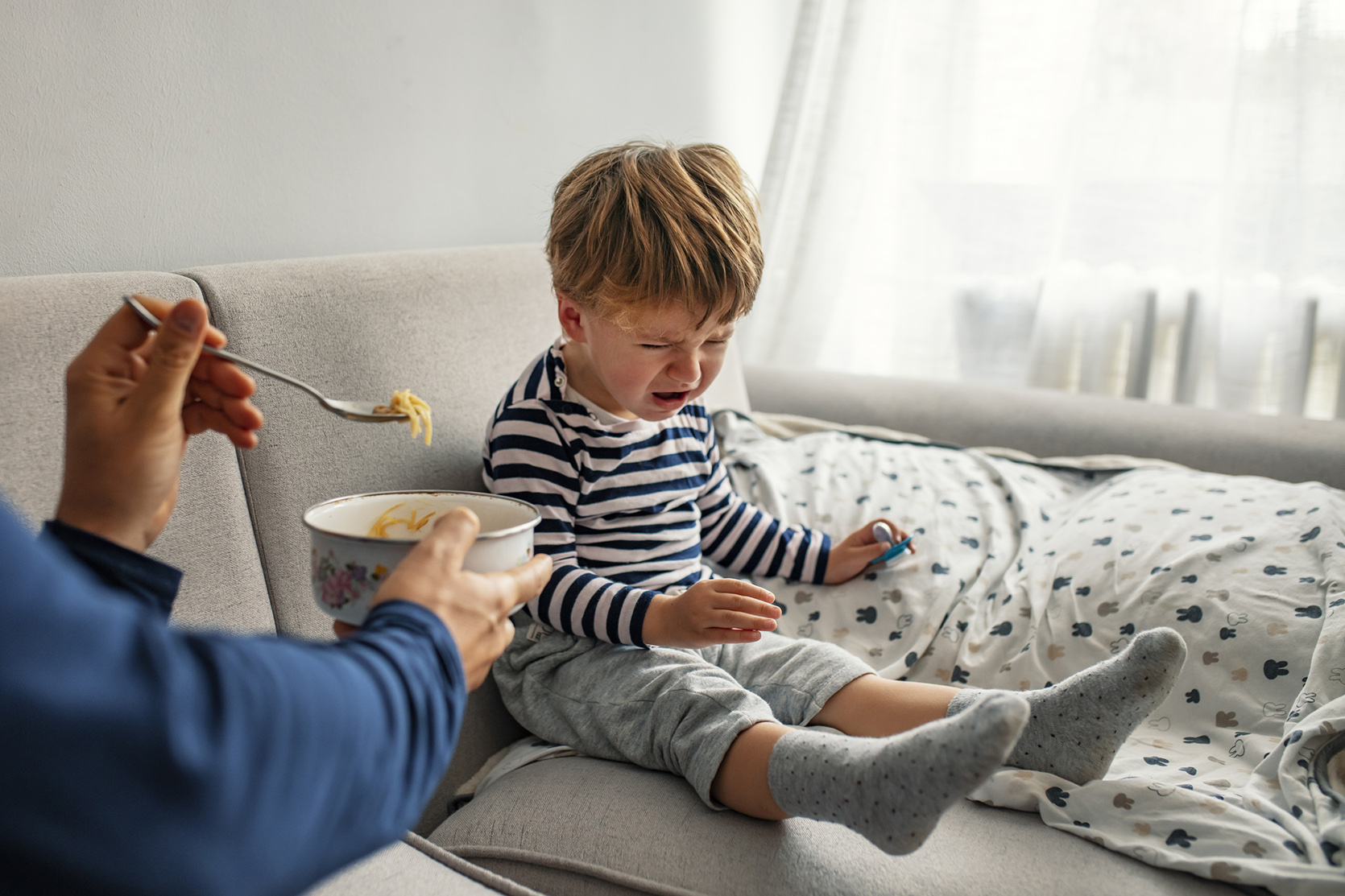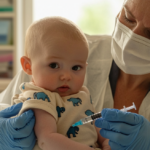
Skąd się bierze brak apetytu u dziecka?
Spis treści:
Brak apetytu u dziecka – możliwe przyczyny
– Zanim zdiagnozujemy u dziecka brak apetytu, należy dokładnie określić, co to właściwie znaczy. Dziecko-niejadek u nas w Polsce to częste zmartwienie rodziców, zupełnie niepotrzebnie – mówi Alicja Sapała-Smoczyńska. – Pamiętajmy o tym, że dzieci jedzą inaczej niż dorośli, potrzebują znacznie mniejszych porcji, a także jedzą wybiórczo, co wynika bezpośrednio z rozwoju. Brakiem apetytu nie jest okresowe rezygnowanie z określonych produktów.
W pierwszym roku życia dziecka większość dzieci je wszystko, co rodzice podsuwają – obok mleka po 6. miesiącu pojawiają się inne pokarmy, które zazwyczaj maluchom smakują. Zmiany zaczynają się w drugim i trzecim roku życia dziecka i są wpisane w naturalną potrzebę decydowania o sobie. Wówczas zaczyna się ona intensywnie rozwijać. Dziecko nie potrafi jeszcze dobrze mówić, precyzyjnie określać, co mu pasuje, a co nie, więc jego samostanowienie zaczyna się. m.in. od określania, co ma ochotę zjeść.
Jak podkreśla pediatra, nie jest to powód do zmartwień i nie jest to realny brak apetytu. Znaczne zmniejszenie łaknienia to stan fizjologiczny, w którym dzieci odmawiają jakiegokolwiek jedzenia. Przyczyny braku apetytu mogą być różne.
Częstą przyczyną braku apetytu u dzieci jest upał. – Gdy jest gorąco, naturalną reakcją organizmu jest obniżenie łaknienia. Nie powinno nas to martwić. Najważniejsze jest kontrolowanie, czy dziecko pije i siusia. Jeśli spadkowi apetytu nie towarzyszą inne objawy, nie powinniśmy dziecka zmuszać do jedzenia. Warto obserwować sytuację. Po kilku dniach apetyt powinien wrócić do normy – mówi Alicja Sapała-Smoczyńska.
Zdecydowanie najczęstszą przyczyną braku apetytu u dzieci jest infekcja. Dzieci, które są chore, mogą odmawiać jedzenia. Nagły brak apetytu u dziecka może oznaczać rozwijającą się infekcję. –Brak apetytu u dziecka mogą wywoływać nie tylko infekcje górnych dróg oddechowych. Każda choroba, która zmusza organizm do walki, osłabia go, wywołuje gorączkę, może skutkować również brakiem apetytu. W takich sytuacjach najważniejsze jest, by dziecko było nawodnione – tłumaczy pediatra.
Zatem brak apetytu u dwulatka może być wynikiem zmian rozwojowych. Całkowicie naturalny jest również brak apetytu, gdy występuje gorączka, a także po szczepieniu.
Brak apetytu u dzieci często towarzyszy infekcjom układu pokarmowego, które objawiają się biegunką, wymiotami i bólem brzucha. Wówczas ograniczenie apetytu jest związane z potrzebą ograniczenia źródła bólu. Jest to reakcja normalna, ewolucyjna i biologiczna.
– Nieoczywistą i częstą przyczyną braku apetytu u dzieci jest zaparcie. Może ono wystąpić zwłaszcza latem, gdy jest ciepło, dzieci przyjmują za mało płynów, przez co kał zatrzymuje się w jelitach. To sprawia, że ochota na jedzenie spada. Jeśli obserwujemy, że dziecko nie wypróżniło się przez 3–4 dni i dodatkowo nie chce jeść, należy zająć się problemem zaparcia, nie samym brakiem apetytu. Po ustąpieniu zaparć, apetyt powinien wrócić – mówi Alicja Sapała-Smoczyńska.
Nierzadko obserwuje się również brak apetytu u dzieci po antybiotykoterapii oraz podczas przyjmowania antybiotyku. – Antybiotyki negatywnie wpływają na kondycję flory bakteryjnej jelit, co może skutkować brakiem apetytu u dzieci. W celu odbudowania flory podaje się probiotyki, dzięki którym organizm wraca do normy – wyjaśnia pediatra.
Brak apetytu u dziecka – czy zachęcanie wystarczy?
Zachęcanie dziecka do jedzenia nigdy nie powinno zamienić się w zmuszanie. Taka sytuacja może poskutkować urazem lub psychiczną niechęcią do jedzenia. Dzieci, podobnie jak dorośli, brakiem apetytu mogą reagować na stres.
– Wielu rodziców spotkało się z sytuacją, w której dziecko nie chce jeść w przedszkolu. Wówczas brak apetytu może być związany ze zmianą warunków, co w dziecku budzi napięcie. W takiej sytuacji warto zadbać, by dziecko oswoiło się z nowymi okolicznościami, zamiast skupiać się na jedzeniu. W ten sposób apetyt szybciej wróci. Jeśli zaś zmusimy dziecko do jedzenia, problem niejedzenia może się znacząco pogłębić – tłumaczy Alicja Sapała-Smoczyńska.
Rodzice często martwią się też, gdy ich dzieci jedzą tylko określone grupy produktów, np. produkty mączne i suche. Jak radzi pediatra, warto pozytywnie zareagować i zachęcać dzieci do jedzenia z poszanowaniem ich wyboru. Gdy dziecko chce jeść tylko makaron, warto postarać się, by do każdego dania sos był zrobiony z innych warzyw. Jeśli wybiera naleśniki, można skomponować za każdym razem nieco inny farsz. Problem powinien ustąpić z czasem.
Ponadto dzieci, które w wyborze jedzenia wykazują pewną sztywność, niekoniecznie cierpią na brak apetytu, lecz może to być jeden z objawów innych zaburzeń. Jeśli dziecko przez dłuższy czas konsekwentnie unika konkretnych grup produktów czy konsystencji posiłków i mimo prób pozytywnego zachęcania do jedzenia nic się nie zmienia, warto obserwować zachowanie dziecka i skonsultować się z psychologiem dziecięcym.
Jak walczyć z brakiem apetytu u dziecka?
– Przede wszystkim nie zalecam walki z brakiem apetytu u dziecka, a poszukiwanie przyczyn takiego stanu i odpowiednie reagowanie. Gdy dziecko ma zaparcia, gorączkę czy jakąkolwiek infekcję, lub jest upał, nie zalecam karmienia dziecka na siłę i namawiania do jedzenia. Najważniejsze jest, by dziecko było nawodnione i by występowała mikcja. To świadczy o prawidłowym funkcjonowaniu organizmu. Z kolei gdy brak apetytu występuje bez wyraźnej przyczyny, zamiast szukać rozwiązań żywieniowych, skupmy się na odnalezieniu źródła spadku łaknienia – radzi Alicja Sapała-Smoczyńska.
Brak apetytu u dziecka – kiedy udać się do lekarza?
Brak apetytu u dziecka jest objawem alarmującym o tym, że coś dzieje się w organizmie. Jednak, jak wiadomo, nie zawsze brak apetytu zwiastuje kłopoty. Jeśli dziecko nagle traci apetyt, inne objawy (takie jak zmęczenie czy senność) nie występują i taki stan przeciąga się, należy dziecko obserwować przez kilka dni. Jeśli łaknienie nie wróci do normy, należy skonsultować się z pediatrą. W sytuacji, w której poza brakiem apetytu pojawią się dodatkowe objawy, warto udać się do lekarza wcześniej.






































